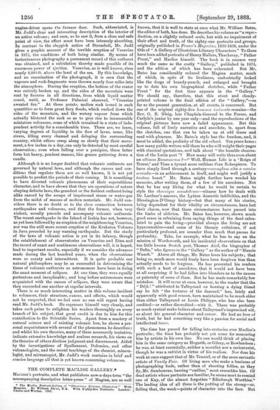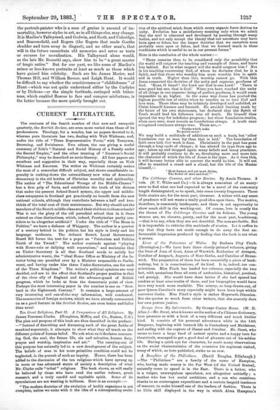THE COMPLETE MACLISE GALLERY.*
MACLISE'S portraits, and what publishers now-a-days term "the accompanying descriptive letter-press " of Maginn, are so well • Ths Mortis. Portrait-Gallery of "IlIasfrMvs Li'erary Characters." With Memoirs. By William Peas, B.A. With Eighty-8re Portraits. London : Chatto and Windus. 1983. known, that it is well to state at once what Mr. William Bates, the editor of both, has done. He describes his volume as "a reprc- auction, on a slightly reduced scale, but with no impairment of their effect and truth, of the eighty-one portraits and groups, originally published in Fraser's Magazine, 1830-1838, under the title of " A Gallery of Illustrious Literary Characters." To these have been added portraits of Henry Hallam, Thackeray, " Father Prout," and Maclise himself. The book is in essence very much the same as the costly " Gallery," published in 1874, and the edition of which has been exhausted. But Mr. Bates has considerably reduced the Maginn matter, much of which, in spite of its liveliness, undoubtedly looked like the dregs of brandy-punch, and enlarged and brought up to date his own biographical sketches, while " Father Prout " for the first time appears in the " Gallery." We should say, therefore, that this stoat and closely- printed volume is the final edition of the " Gallery,"—so far as the present generation, at all events, is concerned. But one of the original eighty-five hommes eminents remains—the Rev. G. R. Gleig, late Chaplain-General to the Forces, and Carlyle's junior by one year only—and the reproductions of the original pictures have now a faded appearance. But this volume, full of lively narrative and anecdote, is, apart from the sketches, one that can be taken up at odd times and read with pleasure. Mr. Bates's style has the freedom, and, it must be added, the prolixity of the old school. Ten years hence, how many public writers will there be who will weight their pages with classical quotations, and talk about " the humble obsecra- tion of the Latin poet "P How many will write thus even about an ultimus Romanorum P—" Well, Human Life is a 'Reign of Terror,' and Time a tyrant more ruthless than Robespierre. To have simply lived through a century—exemplum vitae a cornice secundcc—is an achievement in itself, and might well justify a tantum boast." Mr. Bates might further have weeded his memoirs, after writing them, of a few of his anecdotes. Not that he has any liking for what he would be certain to style the chronique scandaleuse—witness how be deals with Dr. Lardner's amours, the Lytton domestic infelicities, and the Blessington-D'Orsay history—but that many of his stories, being dependent for their vitality on circumstances, have lost their charm, now that these circumstances have passed into the limbo of oblivion. Mr. Bates has, however, shown much good sense in refraining from saying things of the dead calcu- lated to pain the living—provided always the living are not hypersensitive—and some of his literary criticisms, if not particularly profound, are sounder than much that passes for profundity. Take, for example, what he has to say on the mission of Wordsworth, and his incidental observations on that too little known Scotch poet, Thomas Aird, the biographer of "Delta," who figures in the " Gallery " as the author of "Mansie Wauch." Above all things, Mr. Bates loves his subjects ; that being so, much more would freely have been forgiven him than actually needs to be forgiven. He has presented his readers with such a host of anecdotes, that it would not have been at all surprising if be had fallen into blunders as to the causes or paternity of some of them. But he has made remarkably few mistakes. • It will occur at once, however, to the reader that the " Dejk ! " attributed to Talleyrand on hearing a dying friend say he felt " the tortures of the damned," has, lately and apparently with good reason, been maintained to be much older than either Talleyrand or Louis Philippe, who has also been credited—or rather discredited—with it There was probably as mach cynical make-believe about Talleyrand's improvised wit, as about his general character and career. He had no love of truth, but he had something very like a passion for social and intellectual tome.
The time has passed for falling into ecstacies over Maclise's portraits; the time has probably not yet come for measuring him by artists in his own line. No one would think of placing him in the same category as Hogarth, or Gilray, or Rowlandson ; he was, at least essentially, neither a moralist nor a caricaturist, though he was a satirist in virtue of his realism. Nor does his work at once suggest that of Mr. Tenniel, or of the more sarcastic artists of Vanity Fair. Of living men who make a business of photographing fools, rather than of shooting follies, as they fly, Mr. Sambourne, barring "outline," most resembles him. Of dead artists whose portraits are familiar,he seems most to remind one of Kay, of the almost forgotten " Edinburgh Worthies!' The leading idea of all three is the putting of the strong—or, failing that, the weak—points of character into the face. But
the portrait-painter who is a man of genius is assured of im- mortality, however styles in art, as in all things else, may change. It is Maclise's Talleyrand, and Godwin, and Scott, and Coleridge, and Beaconsfield, and Rogers (the Rogers that made Goethe shudder and turn away in disgust), and no other man's, that will in the future resuscitate old memories and serve as texts or excuses for moralisation. His Talleyrand alone would, as the late Mr. Rossetti says, show him to be " a great master of tragic satire." But for our part, we like some of Maclise's minor or less-known portraits at least as much as those which have gained him celebrity. Such are his James Morier, and Thomas Hill, and William Roscoe, and Leigh Hunt. It would be difficult to say whether the sensitiveness or " childishness " of Hunt—which was not quite understood either by the Carlyles or by Dickens—or the simple fortitude, untinged with bitter- ness, which enabled Roscoe to face and conquer misfortune, is the better because the more quietly brought out.



































 Previous page
Previous page